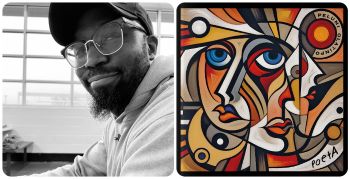The poet talks illustrated covers, Shakespeare, and why love is all you need.

A philosopher and provocateur of our collective consciousness, Washington, DC, poet Pelumi Olatinpo is the author of Poeta: Sonetas and Sonnets, a collection of 303 poems arranged in six movements that examine the human condition in all its hopes, struggles, beauty, and flaws. When not writing poetry, he manages a startup and is a devoted husband and father of two.
Can you share a bit about your background and how it influenced your passion for poetry?
I’ve been fascinated with language for as long as I can remember. I fondly remember getting my first dictionary at 11 and reading it like a textbook whenever I had the chance, even during siesta breaks at school. At the time, I’d just enrolled in an international boarding secondary school in Nigeria. We had a Caucasian British principal who placed a lot of value on literature and introduced us to several Western authors, including Shakespeare, as well as some African poets and writers. These early experiences instilled in me the power of creating worlds with language. Poetry became a natural consequence of reflecting on this world, both in how I see it and how it could be.
What’s the core message in Poeta, and how does it reflect the broader themes you wish to convey?
As cliché as it sounds, the core message is that love is all we really need. Love in all its manifestations and expressions — the political and personal, the local and global, and even its physical and spiritual dimensions. My goal was to show how love, and the lack of it, permeates the beauty and brutality of our world and what we can and should be doing to build the world of our dreams. Through sonnets and sonetas, I explore how love manifests in everything from intimate relationships to societal movements, from spiritual awakening to political resistance. Just as much as the poet, the reader is a witness to love. We are in this together.
Poeta is divided into six movements and introduces a new poetic form, the “soneta.” What is a soneta, and how did it come to be?
A soneta is a six-line poem with no more than 10 words per line and a fixed rhyme scheme of the poet’s choice. This form came from years of writing the traditional English sonnet, albeit without strict adherence to the iambic rule. There were many times I felt constrained by the 14-line structure when fewer lines had already captured my intent. Taking Shakespeare at his word, brevity is the soul of wit, particularly in this age where our attention span is drastically reduced. My African oral-history instinct gave me an appreciation for poetry’s musicality, much like a sonata in music. All these influences led to the creation of the soneta form.
The book’s artwork is striking, with each movement beginning with an illustration taken from the cover. Did you always envision illustrations complementing the text, or did the idea for artwork come later?
Oh, from the onset, the artwork was going to be essential to the book. I wanted it to be a visual and literal work of art — something that would feel like a keepsake. This approach came with its challenges, particularly when deciding the best way to capture such an ambitious work with its various themes. Eventually, I settled on an abstract approach using cubism, a style made popular by Pablo Picasso. The fragmented, multilayered nature of cubism perfectly mirrors how the collection explores love from various angles. On the book’s cover and on the title page of each movement, you see an attempt to capture this in a way that resonates for me artistically.
Rilke famously gave advice to a young poet. What’s yours?
Hahaha. I laugh because I find it humbling to offer [any]. I’d say read and read a lot of those who have come before. Find out what speaks to your soul in the lines of these poets, dead or alive. Then seek to create your own voice by writing, refining, and writing some more. I remember discovering Kofi Awoonor and Ken Saro-Wiwa in my early days and how their words opened new worlds of possibilities in my mind. Every poet you read adds another color to your palette, but the painting must ultimately be your own.
What’s next for you?
I’m building on the foundation of Poeta with a new work titled Manifest Destiny, scheduled for release on September 3, 2025.
Oluseyi Akinyode grew up in the bustling city of Lagos, Nigeria, and now calls Washington, DC, home. She writes about art and life on her Substack blog, “The Unanswered Questions.” Oluseyi holds an undergraduate degree in finance from New York University and is a 2025 DC Commission on the Arts & Humanities fellow and a 2024 recipient of a HumanitiesDC grant.
